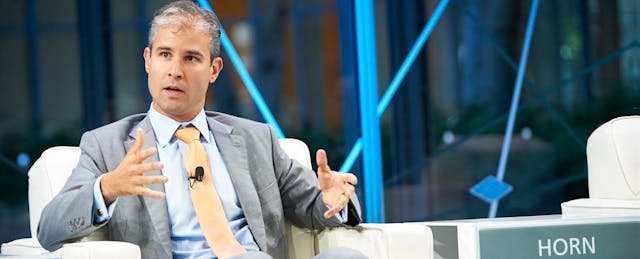Michael Horn left the Clayton Christensen Institute on October 10 in search of new challenges. Now the man renowned for applying “disruptive innovation” ideas to education will find his next career to be even more chaotic.
In a column announcing his departure, Horn expressed a desire to put theory into action by working directly with education companies. Already he’s landed advisory roles at Pedago, a startup based in Washington, D.C. that offers a test prep app for MBA students, and Los Altos, CA-based Intellus Learning (formerly Ace Learning), which helps higher-ed institutions curate and align digital content to course objectives and analyze student outcomes.
Now Horn is adding another hat to his collection: He will serve on the board of directors at Education Elements, which provides consulting, implementation and technology services to help K-12 schools run blended learning models.
So much for a break.
The role offers Horn the opportunity to help grow a familiar business. Since 2007, he and his team were among the first to define and profile the various “ blended learning” models used in schools through a series of books and reports.
“Right after Disrupting Class was published [in 2008], Anthony [Kim, CEO of Education Elements] was one of the first people who cold-emailed me,” he recalls. At the time Horn was helping to lay the groundworks for KIPP Empower, a charter school in Los Angeles. He suggested the school reach out to Kim, who would help design its blended learning program when it opened in 2010.
The San Carlos, CA-based company has since worked with nearly 300 schools across the US, serving more than 120,000 students. And it’ll turn to Horn’s wealth of connections and insights to expand its footprint.
Education Elements has “been pioneers in bringing the station-rotation model in elementary schools,” says Horn. But he acknowledges the approach may not work as well for higher grade levels. The company, he says, is “excited about bringing new models. Now the opportunity for them is, ‘What should high schools look like in the 21st century?’”
Working with high schools presents a new set of challenges and opportunities, says Amy Jenkins, Vice President of Marketing of Education Elements. “Classrooms may be less set up for fluid designs and furniture configurations. Bell schedules can be stricter,” she tells EdSurge. In many college-prep high schools, there is also “more fear that [blended learning] is a distraction, rather than something that better prepares students.”
But at the same time, Jenkins believes “high schools students can be more self-directed, take more ownership and run with blended or personalized learning in amazing ways.”
How many more hats will Horn wear? In addition to running his own consulting gig, he will “probably” join the board of one more company in the K-12 space. And if that’s not enough, he is also a “Principal Consultant” at Entangled Solutions, an advisory service affiliated with Entangled Ventures, which incubates higher-ed companies.
“I am going to over-commit myself,” he tells EdSurge. No kidding.


